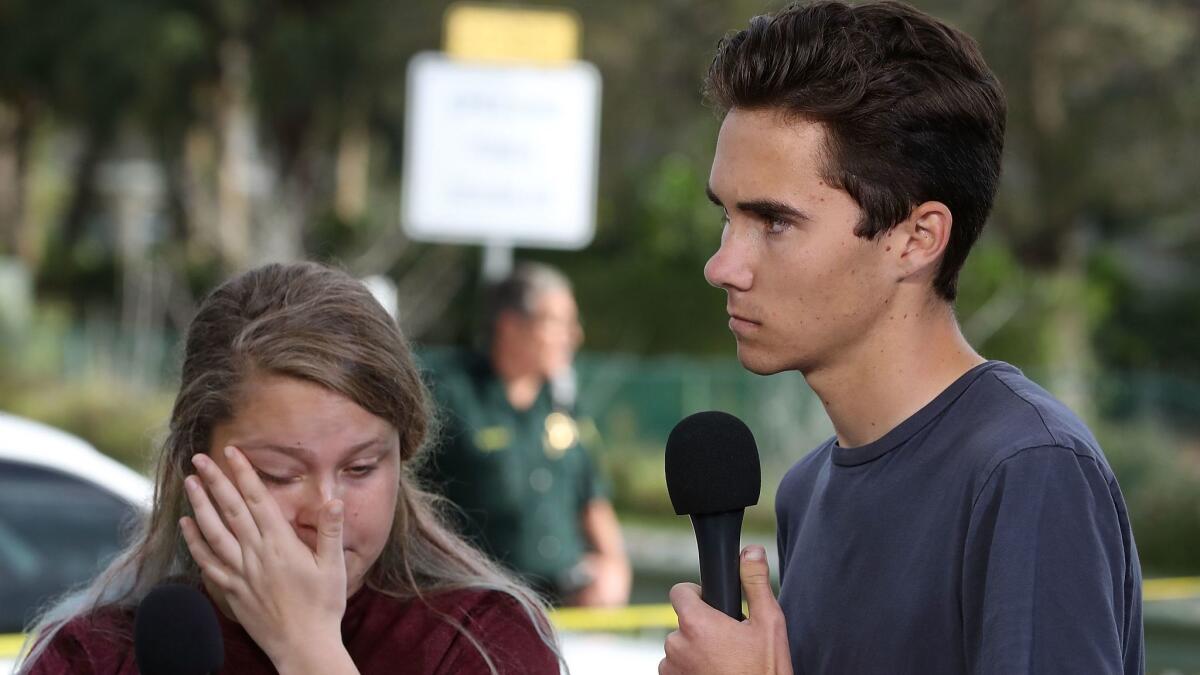Op-Ed: The David Hogg ‘crisis actor’ video wasn’t bullying. It was propaganda

- Share via
On Wednesday, a nasty piece of character assassination summited YouTube’s trending list. The video spread like a rash, and not just among those sympathetic to its wingnut paranoia. If the comments on YouTube and in the media were any indication, it also fascinated hate-watchers.
Culled from a local news segment about a 2017 spat between a lifeguard and a swimmer, it showed a bronzed teen on a beach with the caption “David Hogg the actor.” How could something so basic climb the charts? Hogg is a survivor of the massacre in Parkland, Fla., and one of the newly minted student leaders now calling for tougher gun laws. The video suggested that he is actually a performer, paid by sinister left-wing forces to advocate repeal of the 2nd Amendment.
This defamation tactic isn’t new. As Princeton historian Kevin Kruse pointed out on Twitter, segregationists in 1957 slammed the kids integrating a Little Rock high school as imposters.
Eventually, several hours after it had pervaded the internet, YouTube took down the video for violating its “policy on harassment and bullying.”
Is that all it was?
Effective smear campaigns don’t just tell you what you want to hear. They’re also arousing. Unlike harassment and bullying, but like gory and pornographic images (or drugs including meth and cocaine), attack propaganda shoots straight to the limbic system where our baser nature resides: fear, anger, sex and the instinct to protect children.
The Hogg video hit the spot, stimulating viewers through the crude intoxication of fury. No need to feel sympathy for this survivor. He’s a player in a vast conspiracy.
Politically-themed porn — trolling, conspiracy theories, propaganda — stokes our chronic political arousal. Why do we keep turning to it?
Propaganda is both desensitizing and addictive. Consider how outrage about the video crowded out midweek coverage of the Parkland students’ disciplined and forceful activism, including sit-ins, walkouts, demonstrations and agitating on the national stage for gun control.
The video simply excited the hindbrain more than the demonstrations, and we couldn’t get enough of it.
Indeed, the attack on Hogg created a taste for more of the same, or at least YouTube did. As Paul Lewis observed in the Guardian, YouTube with its “Up Next” algorithm rewards consumers of pornography with more pornography, and propaganda with more propaganda.
None of this is harmless. This is speech with real-life consequences. It invades the body, and pitches its tent in our minds, unsettling the question of the Parkland students’ heroism by superimposing the word “fraud” on it.
In the very early days of the Web, legal scholars including Harvard’s Jonathan Zittrain puzzled over the uses and abuses of online speech. They considered a hypothetical trolling project: a site styled as an information repository about epilepsy that hit visitors with flashing lights designed to induce seizures.
Did swirling, blinking images, designed to interfere with the nervous system, qualify as protected speech? Or were they an instrument of attack?
In 2008, this thought experiment came to life when hackers filled an epilepsy info site with blinking lights. And then, last year, a 29-year-old named John Rayne Rivello tweeted a strobe at the journalist Kurt Eichenwald, who has epilepsy, causing him to suffer a seizure. Rivello’s “speech act” was treated as what it was: an assault on Eichenwald’s cognitive security and neural health.
Rivello faces a count of aggravated assault with a deadly weapon. Eichenwald also has sued Rivello for damages.
Most online attacks do not so demonstrably hurt the body. But they always arouse the brain — sometimes into mental states just shy of seizures — and one day trolling might be considered closer to assault than expression. Just this week, trolls have been censured, suspended and fired in unlikely quarters.
On Tuesday, the department of Health and Human Services suspended Jon Cordova, the principal deputy assistant secretary for administration, for sharing gonzo sex-and-religion conspiracies about Gold Star father Khizr Khan, Hillary Clinton and Sen. Ted Cruz. The same day, Benjamin Kelly, an aide to a Florida state congressman, was fired after he tried to peddle the Florida-students-are-actors bunk.
Uri Hasson, a psychology professor at Princeton, has studied how stories entrance and command the brain, as it shows up on fMRIs. To be under the control of even an anodyne tale is to be at its mercy. To be bombarded with brutal stimuli, including images of terrified kids and blood, as well as the infuriating suggestion that you’re being conned, is to be psychically roughed up.
The Hogg video had that kind of effect. As it climbed YouTube’s trending chart, it felt as though everyone were watching it. It was enraging if you fell for it, and enraging if you didn’t. In the heat of the moment, anyway, the question isn’t whether anyone “believes” the disinformation, as if it were a logical proposition. The question is whether we thrill to it. It seems we do.
Politically themed porn — trolling, conspiracy theories, propaganda — stokes our chronic political arousal. Why do we keep turning to it? Because we are terminally uncomfortable, unable to tolerate both the confusion of our times and, harder still, the silence of grieving.
But the Parkland students are undaunted by the disinformation surrounding the massacre. Off the blocks, they documented their experience, dismantled weasel words like “thoughts and prayers,” and determined not to let ideologues rewrite history. Every bit as powerful as their push for gun control is their intolerance of lies: #WeCallBS.
Twitter: @page88
Follow the Opinion section on Twitter @latimesopinion or Facebook
More to Read
A cure for the common opinion
Get thought-provoking perspectives with our weekly newsletter.
You may occasionally receive promotional content from the Los Angeles Times.









